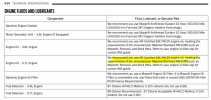You are thinking too hard about this man. If you have an engine failure and they find you using 5W-30, kiss any warranty coverage goodbye. You would have absolutely zero leg to stand on if you tried to challenge it via the MM act. Using the incorrect specification of oil outlined in a user manual would fall under "improper maintenance" 100% of the time when talking warranties.
"Were you using MS-6395 compliant 5W-20 as recommended by the manual?"
"No"
"Case closed"
The manual is very clear (see attached picture), MS-6395 compliant 5W-20 is the oil they want you to use. Use other grades at your own risk if warranty coverage is a major concern for your motor.
View attachment 102268
Will your engine explode if you deviate from this by using 5W-30? No, 99.99% of the time it will be perfectly fine. However, doing so will give the supporting engineers an easy out if that's the case. How do I know? I do this in the aerospace industry ALL. THE. TIME. Every time a warranty claim comes in for a failure analysis the first thing we look at are maintenance procedures and records. Improper fluid specs used? Auto denial. No ifs, ands, or buts.


















